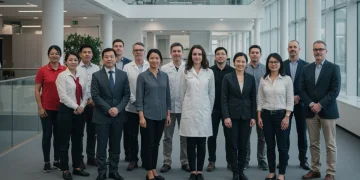Immigration policy UK: what you need to know

The UK immigration policy prioritizes skilled workers and adapts post-Brexit, focusing on economic contributions, cultural enrichment, and future humanitarian support for families and asylum seekers.
Immigration policy UK plays a crucial role in shaping the lives of many individuals and families. If you’ve ever wondered how this affects you or your loved ones, you’re not alone. Let’s dive into the essential aspects and what you should know.
Overview of UK immigration policy
The overview of UK immigration policy is essential for anyone considering moving to the United Kingdom. This policy is designed to manage the flow of people entering the country, ensuring that it meets economic needs while addressing safety and social integration.
Key Principles
One of the critical elements of UK immigration policy is its focus on skilled workers. The government aims to attract individuals with the skills needed in various sectors, helping to boost the economy.
Categories of Immigration
There are several categories under which individuals can apply to reside in the UK:
- Work visas: For skilled workers and temporary laborers.
- Family visas: For those joining family members already in the UK.
- Student visas: For individuals pursuing education in British institutions.
Each category has specific requirements and conditions that applicants must meet.
Additionally, EU nationals have different routes due to the Brexit transition, impacting their rights and obligations in the UK. It’s vital for potential migrants to understand these changes to navigate their options effectively.
Understanding the different types of visas and their eligibility criteria can be complex, but resources such as official government websites provide comprehensive guidance. Addressing the needs of the economy while focusing on the integration of new arrivals remains a fundamental goal.
Overall, the UK immigration policy continues to evolve, adapting to global and social changes. It is crucial for potential applicants to stay informed about policy updates, as these can significantly impact their journey to residency.
Types of visas available in the UK
Understanding the different types of visas available in the UK is essential for anyone wanting to live or work in the country. Each visa type has its own criteria and application process, tailored to various circumstances.
Work Visas
Work visas are for individuals wishing to work in the UK. There are a few categories within this type:
- Skilled Worker Visa: For those with a job offer from a UK employer that meets specific skill and salary requirements.
- Temporary Worker Visa: Aimed at individuals coming to the UK for short-term work in specific sectors.
- Health and Care Worker Visa: Designed for medical professionals and caregivers who wish to work with the National Health Service (NHS).
These visas help address labor shortages in key industries while also ensuring that workers have the skills needed to thrive in their roles.
Family Visas
Family visas allow individuals to join family members already residing in the UK. This category includes:
- Spouse Visa: For individuals married to a British citizen or permanent resident.
- Fiancé(e) Visa: For those intending to marry a British citizen within six months of arrival.
- Dependent Visa: Meant for children or other dependent family members.
These visas are crucial for families wanting to reunite and support one another while establishing their lives in the UK.
Additionally, there are student visas available for those pursuing education in the UK. A student visa allows individuals to study at accredited institutions while also giving them the opportunity to work part-time.
Understanding the intricacies of these visa types is vital for anyone looking to navigate the UK immigration system. Resources are available online to guide applicants through each process, ensuring they meet all requirements effectively.
How to apply for UK residency

Applying for UK residency can seem daunting, but understanding the steps involved makes it much easier. The process varies depending on your visa type and personal circumstances.
Gather Necessary Documents
The first step is to gather all needed documents. Essential documents typically include:
- Passport or ID: A current passport or identity card which proves your nationality.
- Proof of Residency: Documents showing you have lived in the UK for the required amount of time.
- Financial Evidence: Proof that you can support yourself financially.
- English Proficiency: Evidence of your ability to speak English, which may include test scores or certificates.
These documents are critical as they help establish your eligibility for residency.
Submitting Your Application
Once your documents are ready, the next step is to fill out the application form accurately. You can apply online or via paper form depending on your situation. Ensure to double-check all information for accuracy.
After submitting your application, a fee will typically be required. The exact amount varies by residency category. It is best to check current fees on the official UK government website.
After your application is submitted, you may need to attend an interview or provide biometric information like fingerprints and photographs. This is a standard part of the application process and helps verify your identity.
Waiting for a decision can take several weeks or even months. During this time, it’s important to stay updated with any messages from the Home Office regarding your application.
Once your application is processed, you will receive a letter or email with the decision. If successful, you will be granted residency, allowing you to live and work in the UK.
Impact of immigration policy on communities
The impact of immigration policy on communities is profound and multifaceted. These policies shape not only the lives of immigrants but also the culture, economy, and social dynamics of the host communities.
Economic Contributions
Immigrants often fill vital roles in various sectors, contributing significantly to the economy. They help fill labor shortages, especially in healthcare, construction, and agriculture.
- Job Creation: Immigrants start businesses that create jobs for others.
- Economic Growth: Their contributions boost local economies through spending and investment.
- Diversity in Workplaces: Immigrants bring diverse skills and perspectives, fostering innovation.
Through these contributions, communities often experience growth and vitality.
Cultural Enrichment
Immigration policies also facilitate cultural exchange. New residents bring their traditions, languages, and cuisines, enriching the local culture.
When communities embrace diversity, they foster a climate of tolerance and understanding, which can lead to stronger social bonds. Events celebrating different cultures expose residents to new experiences, creating opportunities for interaction.
Social Integration
While immigration can be beneficial, challenges may arise in terms of integration. Policies that promote inclusion are critical. Communities may struggle with aspects such as:
- Language Barriers: Effective communication is key to successful integration.
- Access to Services: Immigrants need access to education, healthcare, and legal assistance.
- Community Engagement: Building strong community ties helps newcomers feel welcomed.
Recognizing and addressing these challenges is essential in ensuring that immigration policies result in positive outcomes for everyone involved.
Overall, the impact of immigration policy on communities is complex, involving both benefits and challenges. To build cohesive communities, it is crucial for policies to support economic contributions while fostering social integration and cultural enrichment.
Future trends in UK immigration policy
The future trends in UK immigration policy are shaping the landscape of immigration and residency. As the world changes, so does the approach to immigration in the UK.
Changes Post-Brexit
One of the most significant shifts is the impact of Brexit. The end of freedom of movement for EU citizens means new rules are in place. With this change, the UK has introduced a points-based immigration system.
This system prioritizes skilled workers, ensuring that those coming to the UK have the necessary skills to contribute to the economy. For instance, applicants will earn points based on criteria such as job offer, skill level, and English proficiency.
Focus on Skilled Labor
Looking ahead, there will likely be a continued focus on attracting skilled labor to fill gaps in the workforce. Sectors like healthcare and technology are particularly in need of qualified professionals.
- Healthcare Workers: Policies will support the recruitment of nurses and medical staff.
- Tech Talent: The tech industry will seek out skilled workers from abroad to drive innovation.
- Engineering Roles: Infrastructure projects are calling for engineers and specialized labor.
By emphasizing skilled immigration, the policy aims to enhance the national economy while addressing labor shortages.
Family and Humanitarian Visas
In the future, we may also see evolving policies regarding family reunification and humanitarian visas. There is a growing awareness of the need to support families separated by borders and offer refuge to those in crisis.
Policies may be adapted to provide pathways for refugees and asylum seekers, ensuring a compassionate response to global challenges. This approach aligns with international commitments and reflects the UK’s values.
Moreover, the integration of immigrants into society will be important. Future policies may emphasize community support programs to help newcomers adapt and thrive.
In conclusion, the future of UK immigration policy is gearing towards balancing the need for skilled workers while ensuring humane policies for families and asylum seekers. Keeping an eye on these trends is vital for understanding how the immigration landscape will evolve over time.
In conclusion, understanding the nuances of UK immigration policy is essential for anyone considering a move to the UK. With a focus on skilled workers, the effects of Brexit, and future trends promising to address family reunification and humanitarian needs, the landscape is constantly evolving. Communities stand to benefit from diverse cultural contributions, while new policies strive to ensure effective integration. Staying informed about these changes is vital for potential immigrants and communities alike, fostering a welcoming environment for all.
FAQ – Frequently Asked Questions about UK Immigration Policy
What has changed in UK immigration policy after Brexit?
Post-Brexit, the UK introduced a points-based immigration system, impacting the rules for EU citizens and prioritizing skilled workers.
How can immigrants contribute to the UK economy?
Immigrants fill crucial job vacancies, drive innovation, and contribute to local economies through their spending and investments.
What options are available for families wanting to reunite in the UK?
There are specific family visas that allow individuals to join family members already residing in the UK, emphasizing the importance of family unity.
What are the future directions for humanitarian support in UK immigration policy?
Future policies may adapt to better support refugees and asylum seekers, ensuring a compassionate response to global challenges.





